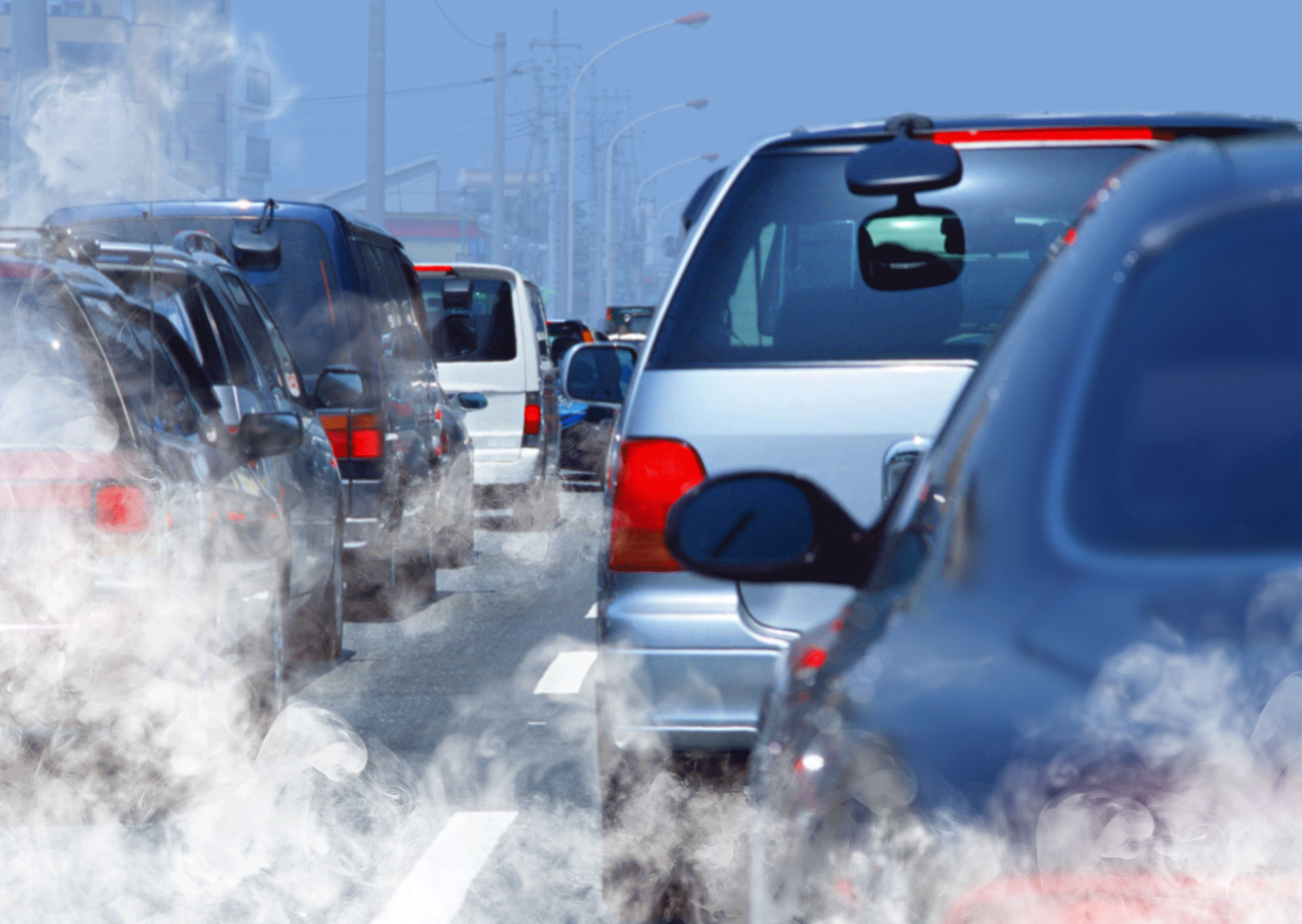Reducing Sulfur, Saving Lives
Air Date: Week of March 7, 2014

Sulfur in gasoline interferes with a car engine’s ability to control other pollutants like nitrogen oxides which can pose a public health threat. (bigstockphoto.com)
Sulfur in gasoline makes automobile engines less efficient and creates more pollutants, which pose a public health threat. The EPA has released new regulations to cut the amount of sulfur in gasoline. Dan Greenbaum from the Health Effects Institute tells host Steve Curwood that the new rules are expected to save money and prevent more than 2,000 premature deaths.
Transcript
CURWOOD: Burning gasoline creates pollution, and the dirtier gas is, the dirtier the air becomes. To protect public health, over the years gasoline has gotten cleaner and cleaner. In the US, lead is gone from gasoline, as is 90 percent of the sulfur it used to contain. But according to the US Environmental Protection Agency, even that last bit of sulfur can promote deadly pollution, so it has announced new rules to cut most of that remaining ten percent. To get a handle on this new development, we turn now to Dan Greenbaum, President of the Boston-based Health Effects Institute. Dan Greenbaum, welcome to Living on Earth
GREENBAUM: Well, I'm really glad to be here, Steve.
CURWOOD: So what exactly are these new EPA regulations when it comes to sulfur and gas?

Sulfur is an abundantly available chemical element. (Bigstockphoto.com)
GREENBAUM: Well, a key thing to getting cleaner cars is making sure the fuel is as clean as possible, so the new rules basically set much much lower levels of sulfur in the fuel and that will in turn mean that every control device, every catalytic converter on every one of our cars, even our existing cars, will work better.
CURWOOD: So this is to keep sulfur from clogging these things up?
GREENBAUM: The sulfur will coat the surface, will mean that these converters will not capture the nitrogen oxides and the benzene and other chemicals that would otherwise be coming out of the car.
CURWOOD: So why take up these new sulfur regulations? What's the danger here?
GREENBAUM: Well the real issue here is there are millions of people in the United States every day during the summer in particular face high levels of ozone smog, and ozone is known to cause serious health effects. It can cause people with asthma to have attacks, kids to miss school, people to miss work. It can even on very high days cause premature death. Cars are one of the most significant contributors to that ozone. So these rules are really designed to cut substantially what cars can contribute on an ongoing basis.
CURWOOD: Some have said this will have a huge impact on public health. How true is that?

Asthma sufferers, especially children, will most benefit from the EPA’s new rules reducing sulfur content in gasoline. (bigstockphoto.com)
GREENBAUM: Well, there’s very strong health evidence that my institute and others have created that says that this kind of change in ozone levels will result in thousands of fewer premature mortalities, tens of thousands of fewer asthma attacks, and frankly over a million fewer days of work lost and days of school lost for kids.
CURWOOD: So who are the people that are really going to benefit the most from these regulations, do you think?
GREENBAUM: Number one, you have people with asthma who...and a lot of kids with asthma. There’s much higher levels of asthma among minority populations than others. So on those high ozone days, that means fewer kids having asthma attacks, having to miss school, having to use their inhalers, and that's a real benefit. I think the second issue is that this will reduce the levels of nitrogen dioxide which is right next to roadways. So everybody, particularly poor communities that live near roadways or ports or other areas, is going to see improved air as well.
CURWOOD: The EPA says that this rule is going to cost something less than a cent a gallon to implement, but when we talked to Bob Greco at the American Petroleum Institute, he said he expects it will cost a lot more.
GRECO: We’re disappointed that EPA moved forward with this new sulfur rule. According to our studies, this is not a cost-effective rule. It has an average manufacturing cost of about six to nine cents a gallon. And that’s the cost to manufacture the fuel.
CURWOOD: How do you respond to that?
GREENBAUM: Having participated in setting rules over many years - I used to be the commissioner here in Massachusetts of environment protection - industry will often come up with high estimates of what those costs will be. Aside from any analysis that EPA has done, I’ve seen two quite well done independent analysis that confirm this very very low cost, and these were done not just by nonprofits, but by expert consultants who do this work for the industry itself.
CURWOOD: Now the automobile industry seems to be embracing this. Why?
GREENBAUM: Well, these rules are part of what is now a unified national set of rules. California has already set these tougher standards earlier, so California and the federals are the same. That means the car companies can make one kind of car for the entire country and and that's to their advantage.
CURWOOD: What about the pocketbook here...how will these rules affect what people spend on health care, what people might spend on vehicle maintenance?
GREENBAUM: These rules will have two major impacts on the pocket book. First of all, it will mean that parents have to take their kids the hospital on high pollution days will not have to do that. That's going to save individuals real money and the society real money. And on top of that, these rules are partnered with a set of rules are substantially improving fuel economy for every vehicle, so what we're going to have in 2017 and 2025 are cars that are dramatically cleaner and take far less gas to go a mile.
CURWOOD: Dan Greenbaum is President of the Health Effects Institute. Thanks so much for coming in.
GREENBAUM: I'm really glad to do it, Steve.
Links
Living on Earth wants to hear from you!
Living on Earth
62 Calef Highway, Suite 212
Lee, NH 03861
Telephone: 617-287-4121
E-mail: comments@loe.org
Newsletter [Click here]
Donate to Living on Earth!
Living on Earth is an independent media program and relies entirely on contributions from listeners and institutions supporting public service. Please donate now to preserve an independent environmental voice.
NewsletterLiving on Earth offers a weekly delivery of the show's rundown to your mailbox. Sign up for our newsletter today!
 Sailors For The Sea: Be the change you want to sea.
Sailors For The Sea: Be the change you want to sea.
 The Grantham Foundation for the Protection of the Environment: Committed to protecting and improving the health of the global environment.
The Grantham Foundation for the Protection of the Environment: Committed to protecting and improving the health of the global environment.
 Contribute to Living on Earth and receive, as our gift to you, an archival print of one of Mark Seth Lender's extraordinary wildlife photographs. Follow the link to see Mark's current collection of photographs.
Contribute to Living on Earth and receive, as our gift to you, an archival print of one of Mark Seth Lender's extraordinary wildlife photographs. Follow the link to see Mark's current collection of photographs.
 Buy a signed copy of Mark Seth Lender's book Smeagull the Seagull & support Living on Earth
Buy a signed copy of Mark Seth Lender's book Smeagull the Seagull & support Living on Earth

